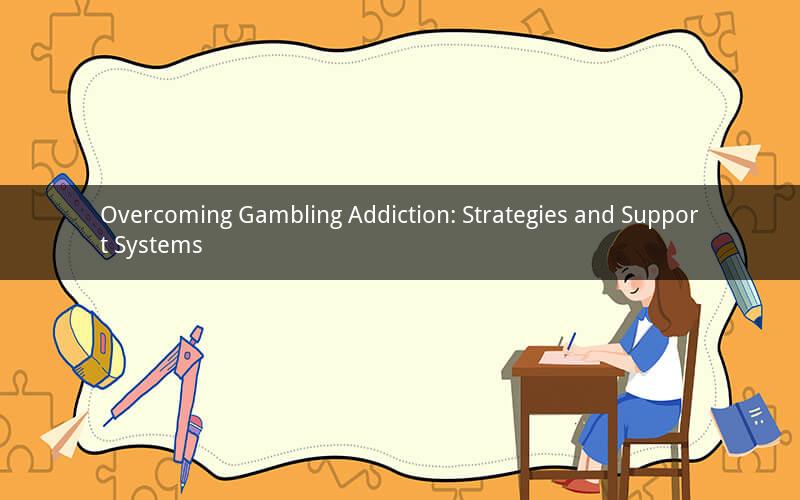
Introduction:
Gambling addiction is a serious issue that affects millions of individuals worldwide. It can lead to financial, emotional, and social consequences, making it crucial to address and overcome this addiction. This article explores various strategies and support systems to help individuals deal with gambling addiction effectively.
1. Understanding the Problem:
To tackle gambling addiction, it is essential to first understand its nature and causes. Gambling addiction is characterized by an uncontrollable urge to gamble, despite negative consequences. It often stems from psychological factors such as the need for excitement, escapism, or even a psychological disorder like depression or anxiety.
2. Recognizing the Signs:
Identifying the signs of gambling addiction is crucial in seeking help. Some common signs include:
- Spending more time and money on gambling than intended.
- Feelings of guilt, remorse, or shame after gambling.
- Lying to family, friends, or loved ones about gambling activities.
- Using gambling as a way to escape from problems or emotions.
- Difficulty controlling gambling behavior.
3. Setting Realistic Goals:
One of the first steps in overcoming gambling addiction is setting realistic goals. These goals should be achievable and focused on reducing gambling behavior. Examples of goals include:
- Stopping gambling completely.
- Reducing the amount of money spent on gambling.
- Limiting the time spent on gambling activities.
- Seeking professional help for addiction treatment.
4. Seeking Support:
Support from friends, family, or support groups is vital in overcoming gambling addiction. Here are some ways to seek support:
- Joining a support group: Organizations like Gamblers Anonymous provide a supportive environment where individuals can share their experiences and receive guidance.
- Seeking therapy: A therapist can help individuals understand the root causes of their addiction and develop coping strategies.
- Informing loved ones: Sharing the problem with friends and family can provide emotional support and encourage accountability.
5. Developing Coping Strategies:
Coping strategies can help individuals manage cravings and reduce the urge to gamble. Some effective coping strategies include:
- Engaging in alternative activities: Finding healthy hobbies or interests that can replace gambling, such as sports, art, or exercise.
- Building a support network: Surrounding oneself with positive influences and individuals who do not engage in harmful behaviors.
- Practicing mindfulness and relaxation techniques: Techniques like meditation, deep breathing, and yoga can help manage stress and reduce the urge to gamble.
- Avoiding triggers: Identifying and avoiding situations or places that trigger gambling behavior.
6. Financial Management:
Gambling addiction often leads to significant financial problems. Effective financial management is crucial in overcoming addiction. Here are some tips:
- Creating a budget: Developing a budget can help individuals track their expenses and prioritize essential needs.
- Seeking financial counseling: A financial counselor can provide guidance on managing debt and developing a plan to regain financial stability.
- Selling non-essential items: Selling items that are no longer needed can help generate funds to pay off debts.
7. Legal and Professional Help:
In some cases, legal intervention may be necessary to address gambling addiction. This can include:
- Seeking legal counsel: A lawyer can provide guidance on the legal implications of gambling addiction and help navigate any legal issues.
- Reporting to authorities: In severe cases, reporting the addiction to authorities may be necessary to protect oneself and others from potential harm.
Conclusion:
Overcoming gambling addiction is a challenging process that requires commitment, support, and a willingness to change. By understanding the nature of the addiction, seeking support, developing coping strategies, and managing finances effectively, individuals can take significant steps towards recovery. Remember, it is never too late to seek help and take control of one's life.
Questions and Answers:
1. Q: Can gambling addiction be cured completely?
A: Yes, gambling addiction can be cured completely with proper treatment and support.
2. Q: Are there any medications available to treat gambling addiction?
A: While there are no specific medications for gambling addiction, certain medications may be prescribed to treat underlying psychological conditions like depression or anxiety.
3. Q: Can a person overcome gambling addiction without seeking professional help?
A: It is possible for individuals to overcome gambling addiction on their own, but seeking professional help increases the chances of successful recovery.
4. Q: How long does it take to overcome gambling addiction?
A: The duration of recovery varies for each individual. Some may experience immediate relief, while others may require ongoing support and treatment for several years.
5. Q: Can a person with a gambling addiction ever gamble responsibly again?
A: It is highly recommended that individuals with a gambling addiction avoid gambling altogether to prevent relapse. Responsible gambling can be difficult for those with addiction, as the urge to gamble may still be present.